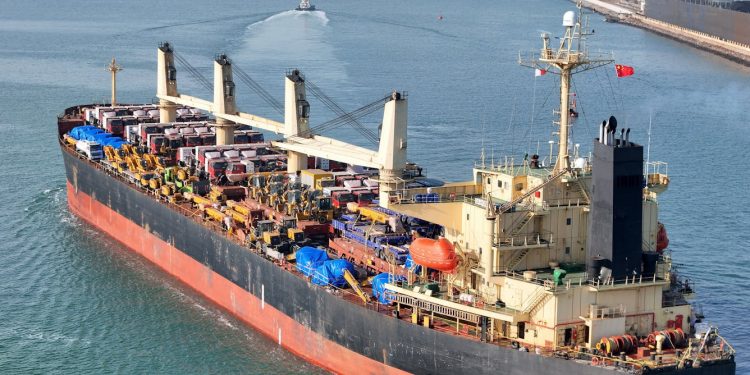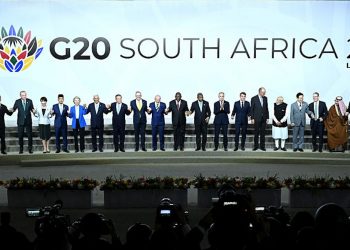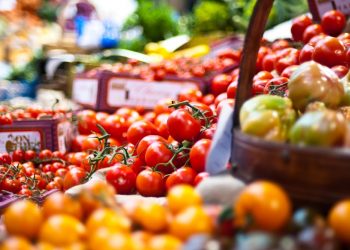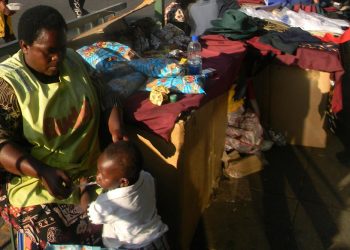As China and the United States lock horns in a trade war, slamming tariffs on each other, entrepreneurs in Nigeria are vulnerable to the fallout. In 2024, 27.8% of imports into Nigeria came from China. In the same year, US exports to Nigeria reached US$4.2 billion. Economist and entrepreneurship researcher Tolu Olarewaju unpacks what could happen if Chinese products destined for the American market were diverted to developing economies, including Nigeria.
What dangers do the tariff tensions pose to Nigeria’s entrepreneurs?
China is the world’s biggest manufacturing nation, producing far more than its population consumes domestically. It is already running an almost US$1 trillion goods surplus, meaning it exports more goods than it imports.
China is often producing those goods at below the true cost of production due to domestic subsidies and state financial support, like cheap loans for favoured firms.
If the goods it currently exports are unable to enter the US because tariffs have made them too expensive, Chinese firms could seek to divert them to other countries. This could be beneficial for some consumers. But it could undercut entrepreneurs who make competing products in these countries and threaten jobs and wages.
Looking at the past profile of Chinese exports to Nigeria, these are some Nigerian goods that could be replaced by cheaper goods from China:
Textiles and garments: Nigeria is the largest producer of textiles in west Africa. The Nigerian textile, apparel, and footwear sector contributed 2.97% to Nigeria’s GDP in 2023 and contracted by 1.75% in the first quarter of 2024. Locally made fabrics, garments and leather goods can easily be replaced by Chinese products, especially in the low-cost and mass-market segment. This is because China is one of the sector’s largest producers globally and can export at low cost.
In 2024, the US was the top destination for China’s textiles exports.
Furniture and home décor: Nigerian artisans are skilled at producing wooden furniture, home décor items, and other interior products. However, China is a global leader in furniture manufacturing. It offers mass-produced, inexpensive items. The wide variety and affordability could displace Nigerian furniture makers. The furniture market in Nigeria is expected to generate revenue of US$5.11 billion in 2025 and experience an annual growth rate of 2.93% between 2025 and 2029.
Footwear: The Nigerian footwear market is valued at US$2.57 billion in 2025 and is expected to grow annually by 9.83%. The Nigerian footwear industry produces around 50 million pairs of shoes annually and employs over 500,000 people. China is one of the largest producers of footwear. In the US, 61.9% of all shoes are imported from China. Nigerian shoe manufacturers may find it difficult to compete with the flood of affordable Chinese-made footwear.
Beauty, cosmetic, and skincare products: The Nigerian soap market is growing. It generated revenue of US$660.5 million in 2024 and is expected to reach US$1.07 billion by 2030. With a population of over 200 million, the demand for soap products is increasing. China is a major supplier of inexpensive, mass-produced beauty products.
What are the biggest challenges holding back Nigerian entrepreneurs?
Weak infrastructure: Frequent power outages make it difficult for businesses to operate and distribute their products. This is a significant barrier, especially in the age of digital technologies, machine learning and artificial intelligence. Poor road conditions also make it difficult to transport goods.
High inflation: Nigeria’s headline inflation rate on a year-on-year basis stood at 24.48% in January 2025, and 29.90% in January 2024. High inflation raises the cost of raw materials, fuel, utilities and transport.
Inflation also means a reduction in the purchasing power of consumers. While inflation should make Nigeria a less attractive market, Chinese goods are typically cheaper than local or western alternatives, even when inflation affects import costs.
Interest rates for business loans are high in Nigeria. This reduces profit margins and makes it harder to maintain affordable prices for consumers.
A poor business environment: Nigeria’s unpredictable political and economic landscape, characterised by shifting policies, and inconsistent regulations, makes it difficult for entrepreneurs to plan. They need to be able to forecast expenses, set pricing strategies or invest in long-term projects.
Corruption also increases the costs of doing business and makes the business environment more uncertain.
While it might seem logical for the government to protect the domestic business environment with blanket tariffs as suggested by the Lagos Chamber of Commerce and Industry, a more strategic approach is needed, one that focuses on targeted tariffs and investing in sectors with strong growth potential.
Limited access to finance and high interest rates: Access to finance is a major barrier due to high interest rates and unreasonable collateral requirements for business credit.
Currency depreciation and exchange rate volatility: The Nigerian naira has depreciated against foreign currencies in recent years. Entrepreneurs who rely on imports for raw materials or equipment have been hit hard by fluctuating exchange rates. Rising import costs can lead to even higher production costs. For businesses looking to export, this volatility can reduce the profitability of foreign sales, discouraging expansion into international markets.
What should Nigeria’s entrepreneurs do to prepare for any potential fallout from the China-US trade war?
Identify niche market needs: They should identify a market need that is not being met or that is under-served and cannot easily be met by Chinese goods.
Focus on customer service: This way, entrepreneurs can build customer loyalty and reputation despite the influx of cheap goods.
Embrace innovation: Nigerian entrepreneurs should be open to new ideas and technologies that can help them create new products and services, increase efficiency and reduce costs.
Diversify supply chains: Relying heavily on imports from one country, especially raw materials, machinery, or electronics, can lead to shortages and price hikes if trade tensions escalate. Businesses should identify alternative suppliers, explore local sourcing options, and build stockpiles of essential inputs.
Explore new export markets: Nigerian entrepreneurs should exploit regional trade agreements like the African Continental Free Trade Area for easier access to African markets.
Adaptability and value creation: Businesses that focus on value creation are best positioned not just to survive but to thrive amid global shifts. Raw material exporters (for example, cashew and cocoa) may be vulnerable to price shocks. Value-added products offer better margins and greater market protection. Entrepreneurs should consider investing in light manufacturing or local processing, such as turning cocoa into chocolate.
Tolu Olarewaju does not work for, consult, own shares in or receive funding from any company or organisation that would benefit from this article, and has disclosed no relevant affiliations beyond their academic appointment.
















